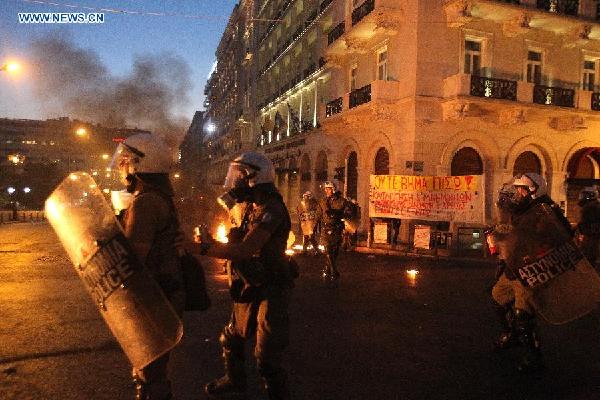The Greek leadership capitulates
- By Heiko Khoo
 0 Comment(s)
0 Comment(s) Print
Print E-mail China.org.cn, July 16, 2015
E-mail China.org.cn, July 16, 2015
|
|
|
Anti-bailout protesters clash with riot police in Athens, Greece, July 15, 2015. Anti-austerity protests organized by trade unions and opposition parties on Wednesday evening in front of the Greek parliament have been marred with violent clashes which broke out between protestors and anti-riot police. [Xinhua/Marios Lolos] |
On July 5, Greece voted by a 61 percent majority to reject harsh austerity imposed by its creditors. So why did the Greek Prime Minister Alexis Tsipras accept even harsher demands only a week later? It was because during that week, bank closures and severe limits on daily cash withdrawals were imposed, and the people stared into a future of economic abyss. It seems that Europe's leaders were determined to teach Greece a lesson.
The Greek parliament votes to accept Europe's austerity package this week. However, there still remains the outside chance of continued resistance to it, as the Greek trade unions have called a general strike for Wednesday to oppose the deal.
At the European summit meeting, the leaders of Germany and Finland in particular regarded the Greek No vote as an insult to sacrosanct rules of capitalism. They kept emphasizing that they do not trust the Greek government because it called a referendum. And had not the Greek people voted to defy economic necessity? Influential figures in the German leadership believed that ousting Greece from the Euro was better done fast -- like emergency surgical intervention to amputate the leg of a patient with gangrene. It was hoped that this would stop the disintegration of Europe at the hands of popular anti-austerity movements in Greece, Spain, Italy, Portugal and elsewhere.
When European leaders came out of the all-night meeting on Sunday with their new deal, Tsipras hugged France's President Francois Hollande. Tsipras sees Hollande as an ally in his mission to help shift Europe away from austerity in the next period. It is true that Hollande is under intense pressure, as he is deeply unpopular at home. In order to regain support, Hollande portrays himself as being sympathetic to Greek problems and needs, and he has stated his opposition to endless cuts and austerity. France also has closer historical and cultural connections to the Mediterranean countries of Europe and Africa, than Germany does; so Hollande tried to position himself as a dealmaker between Germany and Greece.
In Germany, the Social Democrats sided with Hollande, and sought to patch together a deal with Tsipras. However, they are also junior partners with Chancellor Angela Merkel's conservative, Christian Democratic Union.







Go to Forum >>0 Comment(s)